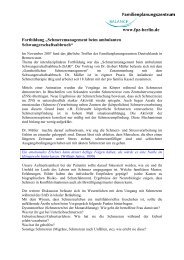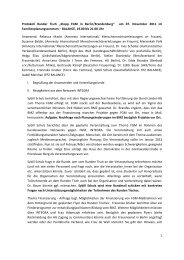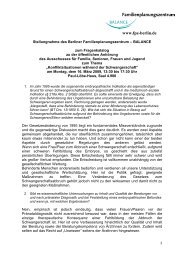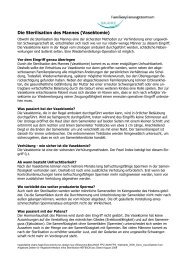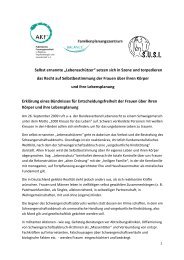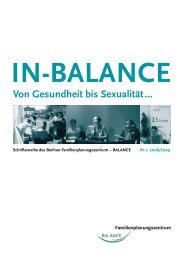Listening to African Voices - FPZ
Listening to African Voices - FPZ
Listening to African Voices - FPZ
Create successful ePaper yourself
Turn your PDF publications into a flip-book with our unique Google optimized e-Paper software.
and describes the pain she suffered, but at the same time herwish was <strong>to</strong> be part of the tradition:“Gambian women have <strong>to</strong> be circumcised <strong>to</strong> uphold thefamily honour. Myself, I have been cut two times. Theysaid the first time it had not been properly done. I haveterrifying and painful memories of it, but I also wanted<strong>to</strong> hear the Kankouran 29 screaming and <strong>to</strong> be part of thedancers.” (woman of Gambian origin)Another Gambian key informant also referred <strong>to</strong> her ownFGM/C as a difficult experience, but emphasises at the sametime the importance <strong>to</strong> carry on with the tradition:“I am part of the generation who went through femalecircumcision a long time ago. I can’t tell you exactly whenit was, but I can tell that it was a very hard experience.My memories of it? I am sorry, I cannot tell you. I preferkeeping them <strong>to</strong> myself. I know that people are againstthis practice nowadays, but it remains our tradition. It is apractice that gives value <strong>to</strong> the <strong>African</strong> woman.” (womanof Gambian origin)About one third of the participants (35 out of 90) had one ormore daughters; the <strong>to</strong>tal number of reported daughters was49. Only 16 of the girls were living in Germany. Out of the49 girls, 24 girls had undergone FGM/C which is almost halfof the cohort of daughters of the immigrants. All but one ofthese girls are growing up in Gambia and not in Germany.Only one of the girls living in Hamburg was concerned. Shehad come <strong>to</strong> Germany only a few years ago with her motherand had already been subjected <strong>to</strong> the practice prior <strong>to</strong> herarrival in Germany.Most of the parents with affected daughters were men (12men compared <strong>to</strong> 2 women). It seems that Gambian mentend <strong>to</strong> migrate <strong>to</strong> Germany for labour, leaving spouse andchildren behind. The girls are left under the guardianship ofthe traditional women society in Gambia and are unlikely <strong>to</strong>be spared from FGM/C.All parents with non-circumcised girls affirmed that they hadno intention of taking their daughters through FGM/C. Onlyone woman said that she was uncertain, but since the daughterhas a German father who is opposed <strong>to</strong> the practice, itcan be assumed that the girl is not at risk.The interviews with the Gambian community membersreported that girls born in Germany are at a moderate risk ofbeing subjected <strong>to</strong> the practice. They are often considered29 In Gambia, the rites including FGM/C are usually terminated with adancing ceremony. Afterwards a ghost called Kancouran comes <strong>to</strong>the village and only those who are part of the tradition are safe <strong>to</strong>be outside once he arrives.as Europeans and parents put each other on guard <strong>to</strong> makesure that girls remain un<strong>to</strong>uched when going on holidays.A Gambian man said <strong>to</strong> the researcher that there is always“need <strong>to</strong> be vigilant when a daughter is going on holidaysand <strong>to</strong> sit down with the mother and explain <strong>to</strong> her that thechild is born as a German and cannot undergo traditionalpractices.”5.5.5.4. Perceptions related <strong>to</strong> the practiceAll participants had heard of the practice and the largemajority (88%) considered it as an advantageous practice.The proportion of women perceiving benefits in FGM/C washigher (94%) than that of men (84%). The most frequentlynamed benefits were social acceptance and better marriageprospects for the girls and women who have undergoneFGM/C. Over 60% of the men and over 80% of the womenraised these two <strong>to</strong>pics when discussing the advantages.Especially women feel that FGM/C is the only guarantee offinding a husband and of becoming an accepted member ofthe society:“It is our tradition and I believe it <strong>to</strong> be a good one. Femalecircumcision gives a good status <strong>to</strong> the women anda good image <strong>to</strong> the women. You know that people ask alot of questions before marriage. For getting married, youneed <strong>to</strong> be circumcised; otherwise you will not get a husband.It is our tradition and it has <strong>to</strong> be continued. I knowthat people are nowadays against this practice, but it is atradition that gives real value <strong>to</strong> <strong>African</strong> women.”(womanof Gambian origin)Another advantage that was raised by a significant proportionof participants (over 40%) was that immigrants of Gambianorigin consider FGM/C <strong>to</strong> be a source of cleanliness,making the woman pure and ensuring her hygiene.5.5.5.5. FGM/C and religionA minority of 5 out of 90 participants believe that FGM/Cis a religious requirement for Muslims. It seems that FGM/Cis for Gambians more of a social convention than a practiceassociated <strong>to</strong> religious ideologies.5.5.5.6. Perception of disadvantages and knowledge of risksand consequencesOver 70% of the participants had no knowledge about thehazards and effects of FGM/C. Thus, it can be concluded thatthe awareness is relatively low among the Gambian immigrants.There were no differences between men and womenor different age groups. Only a handful of participantsnamed negative effects such as difficulties during delivery,problems during intercourse, bleeding or infections.<strong>Listening</strong> <strong>to</strong> <strong>African</strong> <strong>Voices</strong> 57






